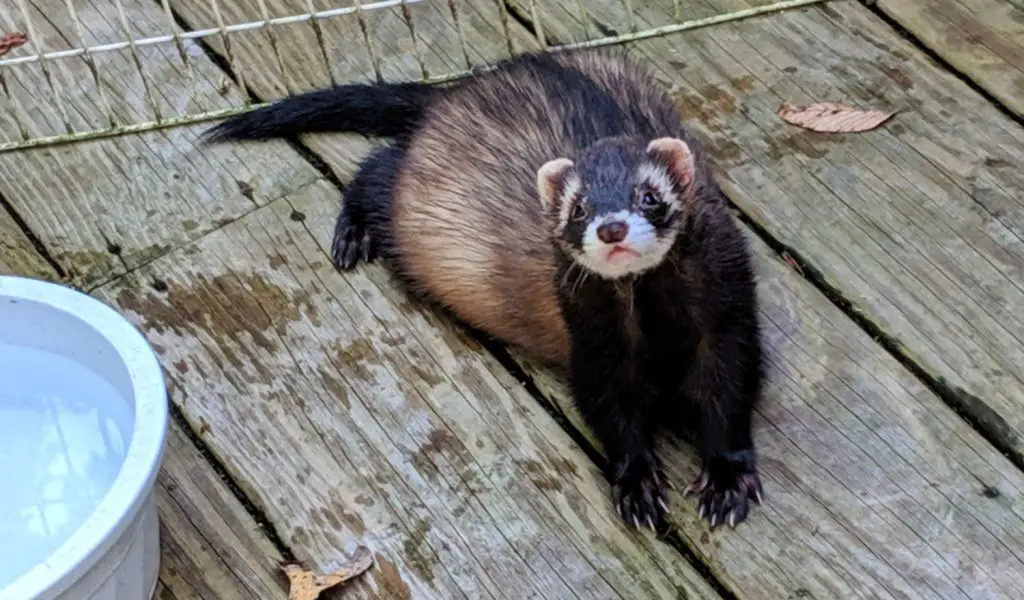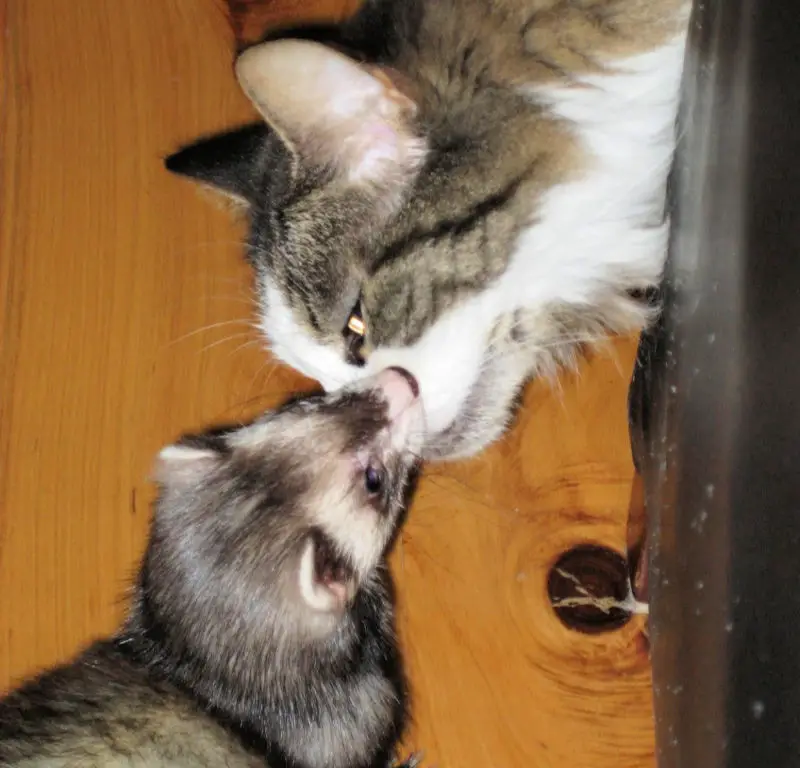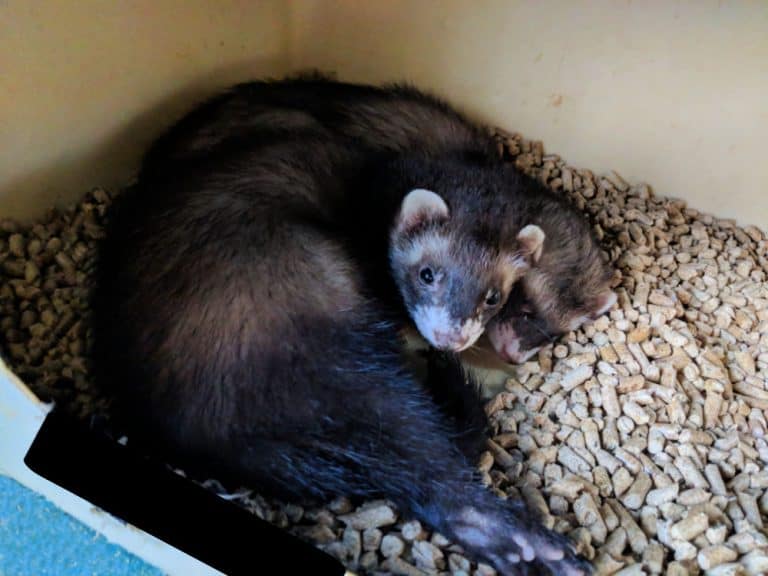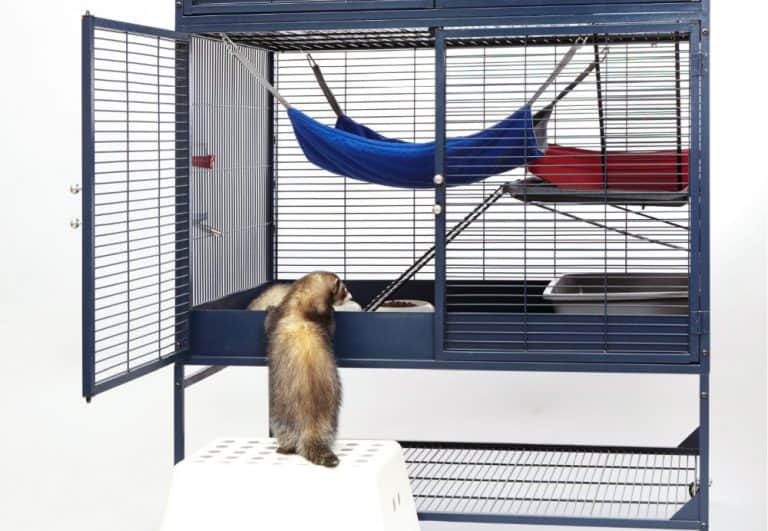Do Ferrets Need Companionship? Or Can They Be Happy Alone?
Are you considering getting a ferret? Ferrets make great pets and are lots of fun. Perhaps you’re trying to decide whether to get one or two ferrets? Ferrets are naturally quite sociable creatures; they do enjoy living in groups. Most ferrets would like the company of another ferret.
In the wild, ferrets do live in family groups for their whole lives, so it is generally considered best to have two ferrets. Domestic ferrets are bred from polecats, which are social animals that are very active and energetic. However, some pet ferrets don’t seem to mind being on their own; it all depends on your ferret’s personality and how much time you have to spend with your ferret.

Can a ferret be happy alone?
While it is possible to have a single ferret, it is generally considered a best practice to have at least two ferrets. Ferrets are social animals who are very active and energetic, so having more than one helps keep them happy and entertained.
This article will look at whether ferrets can be happy living alone or if they would prefer company.
Does a Ferret Need a Friend?
Ferrets usually are very sociable characters and enjoy spending time with other ferrets. It’s considered best to keep them in pairs or larger groups, as this is how they would live in the wild.
However, just like people, they are all individuals, and some pet ferrets prefer to be on their own. If they’ve been on their own for most of their life, it may not be the best idea to introduce another ferret, especially if it’s a younger ferret. This is because ferrets have social hierarchies.
If you have other types of pets in your family, they may be able to provide a bit of companionship for your ferret, but this also depends on individual animals. Some ferrets can feel threatened by dogs and cats and may want nothing to do with them. You should always be watchful of your pets when they are playing together, especially if they are two different species.
Do Ferrets Need Their Own Space?
Most ferrets enjoy having another ferret for company, but sometimes your ferret would likely prefer to have its own space. If you have two ferrets that are living together, it may be a good idea to create two separate enclosures for them to live in. This is particularly useful if you have two ferrets that usually get on well but sometimes have fights. You’ll be able to separate the ferrets if a fight breaks out.
If you have two or more ferrets, they must have a big enough room to live in. Problems can sometimes occur when ferrets start fighting over territory. If you decide to get two ferrets, its best to get them from the same litter. They will already be bonded, and there will be less likelihood of problems such as fighting.
Can I Introduce Two Older Ferrets?
It is possible to introduce two ferrets who haven’t grown up together and for them to get on well. It is, however, essential that the ferrets are very carefully matched to avoid serious injury. They should be introduced slowly and shouldn’t be left alone until you are sure that they will get on.
How two ferrets that have never met are likely to get on will be determined by several factors. The ferret’s genetics and personality are among the main things that will decide whether or not they will get on.
The size of the ferret’s accommodation is also likely to play a part in how well they get on. If two or more ferrets are living together, they should have an adequate enclosure, which includes space to run around and hide. The ferrets should be able to get away from each other and hide if they need to. When ferrets are kept together in a small space, they are more likely to have fights, which could turn nasty.
The number of ferrets that you choose to keep together is also likely to have a bearing on how they interact and cope with living together. When introducing ferrets, they may react unexpectedly, and this could be due to their previous experiences of living with other animals. If your ferret has lived alone for most of its life or has had a bad experience with another ferret, it may be timid or aggressive towards any new ferret that you introduce.
It’s crucial to introduce ferrets to each other slowly over a longer period. Introductions should be well supervised; if a fight breaks out, this could result in severe injuries. If you’re not careful, you could end up with an expensive trip to the vets and two very unhappy or injured ferrets.
Set up Individual Cages
If you’ve just introduced two ferrets, they will likely get on quite well together, but sometimes fights do happen. It’s a good idea not to leave two newly introduced ferrets together at night until you’re sure that they get on well.
It would be best to set up two separate enclosures for them to live in. This would give each ferret their own space when you are not around. When you’re at home, you’ll be able to let both your ferrets out to play and interact with each other, while keeping an eye on them. Ferrets are very amusing, and it’s fun to watch two ferrets playing together. They are likely to keep you entertained with their antics for hours.
Once you’re sure your ferrets are well bonded and get on with each other, they may be able to live together full time. This should be fine as long as the ferrets can get away from each other when necessary. You should also remember that you’ll need a bigger cage for two ferrets. Don’t expect them to live happily in the same enclosure that you’ve been keeping a single ferret in.
Keeping and Introducing Groups of Ferrets
Ferrets can live together quite happily in groups if they are family members or have been carefully matched and introduced to each other. In the wild, ferrets are social creatures who live in family groups, and a single pet ferret may need companionship.
When ferrets are first introduced, they are likely to bicker a lot, especially if they’re three or more. You shouldn’t worry too much about this as it’s probably just little arguments over food, rather than a serious fight.
It’s a good idea to regularly observe your ferret’s behavior so that you know when things are ok and when an argument is more likely to turn nasty. There is a big difference between ferrets that are just play fighting and animals at war who are likely to injure each other.
Problems are likely to occur if one of your ferrets corners the other one. This will mean that the cornered ferret can’t get away and will start to feel trapped. A trapped ferret is more likely to get aggressive.
If you have a group of ferrets, it’s likely that they will develop a hierarchy and will eventually get on with each other. Sometimes this isn’t the case, and if you feel that one ferret isn’t getting on with the rest or is being picked on and injured, you’ll have to remove it from the group and keep it separately.
The Different Types of Fights
Ferrets often communicate how they are feeling to other ferrets by fighting. There is a big difference between play fighting and more serious arguments. Here are some things that you should look out for to see if your ferrets are getting on.
Play Fighting
Play fighting amongst ferrets is nothing to worry about and is healthy behavior. It’s often funny to watch your ferrets play fight as they enjoy frolicking around with each other in the evening when they first wake up. Two ferrets that are play fighting will dance around each other. They will hiss a lot and arch their backs and then roll around together. You’ll also see them biting each other, and they will often pounce. Play fighting isn’t severe, and neither of your ferrets will end up getting hurt.
Fighting for Dominance to See Whose Boss
Sometimes a play fight will start to look more serious, but often this is just one ferret telling another that he is the boss. Fighting for dominance is common and is the ferret’s way of becoming or staying the alpha ferret of the group.
Dominance fighting usually involves one ferret trying to intimidate another. They will do this by fluffing up their fur, and there’s likely to be a lot of hissing. The dominant ferret will also bump into the weaker ferret while screaming at them. These types of fights can be a bit unsettling for owners but are usually more of a performance to show whose boss and no one will be injured.
This type of show tells the other ferrets not to mess with the one who is top dog. It’s common that after a dominance fight, the winner will drag the other ferret around the room by the scruff of their neck. This is likely to result in the loser screeching, more out of resentment then pain.
Many owners are worried when they see their pets engaging in dominance fights, but in most cases, the less dominant ferret won’t get seriously injured. You must keep an eye on any disputes in case they get worse.
Will a Less Dominant Ferret Flee?
During dominance fights, it’s common for a less dominant ferret to get away from the situation. If the ferret can’t get away, they will likely bite the other ferret and then flee. However, this will usually result in a chance.
Running away is likely to be a less dominant ferret’s first tactic. If the ferret is unable to distance themselves and their enemy, they may have to stand their ground. You should be careful if you have one ferret that’s trying to run away but can’t as this is when injuries could occur. You should separate your ferrets if things get nasty to avoid them hurting each other.
How to Recognize More Serious Fighting
Sometimes a dominant ferret wants to see off another ferret completely, and if this is the case, the fight will very quickly become aggressive. If your ferrets are going for each other’s throats, it’s time to split them up before they get wounded. Although these fights are seldom life-threatening, the ferrets are likely to sustain injuries that will need to be treated with antibiotics.
Do I Provide Enough Companionship for my Ferret?
If you want to avoid fighting and choose to have just one ferret as a pet, you may be wondering if you provide your ferret with the companionship it needs. When you first get a ferret, it will need to get to know you as it may be a bit timid at first. It’s recommended that your ferret spends at least two hours every day outside of its cage. During this time, you can provide your ferret with companionship by playing or wrestling with it. Your ferret will enjoy snuggling with you or even playing games such as hide-and-seek.
Ferrets can provide you with hours of fun, whether you have just one or a whole group. It’s likely that once you get to know your ferret, you’ll want to spend time together, ferrets can provide companionship and are also great at providing stress relief. If you’ve had a bad day at work, you’ll soon forget it when you see your ferret. Your ferret may also enjoy going for a walk outdoors, which will provide you both with exercise.
Other people can also help to provide companionship to your ferret and keep it entertained while you’re not there. If you let children play with your ferret, make sure they know how to handle them correctly and safely.
Can My Ferret Play with Other Animals?
The answer to that is always, it depends on the animals in question. If you also have a cat or a dog, it may be tempting to let them play together to see if they will get on. And depending on your particular dog or cat it may be possible. However, you always want to introduce different species with an abundance of caution!
Consider your dog or cat carefully before introducing them. Does your have a high prey instinct? Is your dog a breed that is used for hunting small prey? Is your dog or cat more laid back? It is important to take in to account the individual breed qualities as well as the animal as an individual before you think about introducing them to your new ferret.
Personally, I have a house full of animals and they all co-habitat pretty well. However, they all have their own spaces. When I am not home or when I can not be supervising my pets closely, any of my small pets are confined to their respective cages or spaces so that no one gets hurt. I love all my animals, why risk putting them in an unsafe environment where they can get hurt? It’s not worth it!
Cats and Ferrets

Cats and ferrets sometimes get on, but this often depends on their temperaments. In some cases, ferrets and cats will fight and won’t get on. Sometimes, it will take a while for them to get used to each other and then put up with each other but may not be the best of friends.
Cats and ferrets are both territorial by nature and could feel threatened by each other. If you are introducing your ferret to a cat, you should do so slowly and carefully and provide close supervision at all times. You’ll need to separate the two animals if either of them becomes hostile.
Dogs and Ferrets
It’s not a good idea to introduce your ferret to a dog, although there are some cases where the two have become the best of friends. Many species of dogs were initially bred to hunt for prey. Your dog is likely to think of your ferret as being a snack rather than a friend. If you own a larger breed of dog, it may be overwhelming for a ferret.
Ferrets and Smaller Pets
If you have other small animals such as rabbits, guinea pigs, or hamsters, its not a good idea to let your ferret play with them. These animals would all be considered prey to the ferret, and allowing them to mix could result in your pet becoming seriously injured or even killed.
Conclusion
Most ferrets do like the company of others of the same species, but this isn’t always true. If you decide to get another ferret, you’ll need to introduce your pets slowly and carefully. It would be a good idea to set up two separate enclosures if you have the space and the money to do so.
Keep an eye on how your ferrets interact and especially watch them if they are play fighting to make sure that things don’t become more serious. Having two ferrets and watching them frolic around while playing will keep you entertained for hours.
If you choose only to have one ferret, you must allow it to have enough time every day out of its enclosure. You should aim to play with your ferret or take it for a walk for at least two hours a day. This will stop it from getting lonely or developing behavior problems. If you spend lots of time with your ferret, you’ll find that you can form a strong bond.
It’s also worth noting that ferrets live on average 5-7 years, so you must have enough time and energy to spend on a ferret. Don’t get a ferret as an impulse buy as they are becoming part of your life for a long time.
Related Questions
How long do ferrets live?
Ferrets have an average life span of 5 to 7 years. However, with proper care, some “record breakers” have lived as long as ten years. Ferrets are plagued with several types of cancers commonly seen in pet ferrets, even at a young age, that tend to shorten their lives.
Are Ferrets Nocturnal?
Ferrets can adapt their schedule to yours. You’ve probably heard that ferrets are nocturnal, but they are actually crepuscular, which means that they are naturally more active at dawn and dusk. For many working ferret parents, these are ideal times for ferret playtime. However, a ferret’s will easily adjust it’s schedule to yours. Just wake them up when you want to play. They’ll sleep when you’re gone.
For more about ferrets








